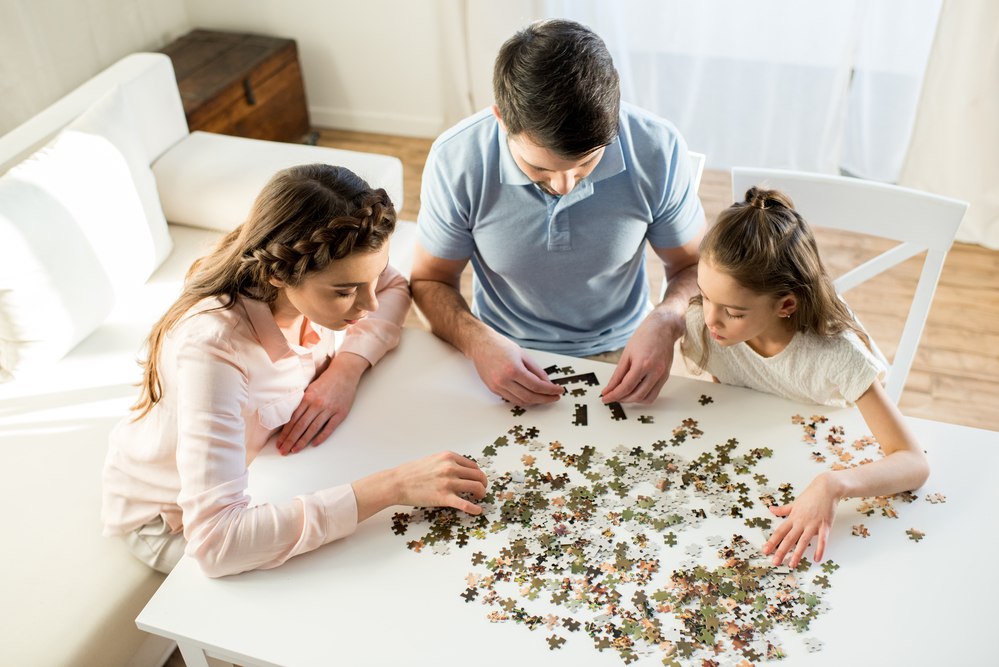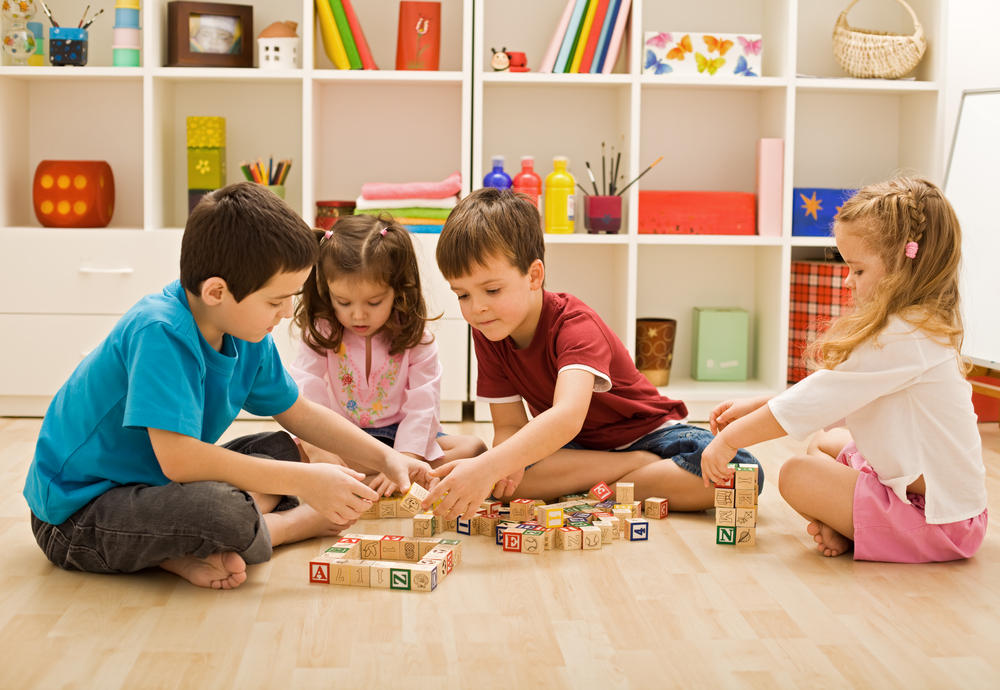Did you know there are six stages of play in child development? Today, we’ll take a closer look at the final stage, called cooperative play, and explain how you can incorporate it into your child’s routine.
With our help, you’ll learn what cooperative play entails, what its benefits are, and plenty of ideas to try at home. From building a fort to putting on a play, our six engaging activities will strengthen your child’s social skills in fun, new ways!
The 6 Stages Of Play
Cooperative play is just one of the six stages of play your child will experience as they develop. However, before we learn about cooperative play, let’s take a look at the other five stages and what you should expect from each.
Remember: These stages of play should simply be used as a guide for parents to better understand their child’s development. It’s perfectly normal for children to enjoy all stages of play at any age, so don’t fret if you notice them switching back and forth between stages.

Unoccupied Play
The first stage of play is unoccupied play. This stage typically begins anywhere from birth to three months of age and is displayed through babies learning to kick their legs and explore their immediate surroundings.
Solitary Play
The second stage of play is solitary play. In this stage, children begin to play alone with toys and do activities in a more organized capacity.
This is a very normal, healthy part of development and prepares children for future play with others.
Onlooker Play
Stage three is onlooker play, in which children observe others playing. Similar to “people watching” in adulthood, observing helps children understand social interaction and the unwritten rules of playing with others.
Parallel Play
In stage four, parallel play, children will often engage in their own activity while in the company of others. While they’re not yet playing with a group, they’re taking in lots of information to prepare for interacting with other children.
Associative Play
Next is associative play. In this stage, children are able to put their newly acquired knowledge about engaging with others to the test.
This is a significant milestone for children as they continue to develop their interest in others and practice their social skills.
Cooperative Play

Finally, the sixth stage of play is cooperative play, which is what we’ll focus on today. As the name suggests, this stage of play centers around children learning to collaborate and cooperate with others to achieve a common goal.
By engaging in cooperative play, your child develops their social skills in the following ways:
- Learning about the importance of rules and negotiation
- Beginning to resolve conflict through their communication skills
- Gaining empathy for others by understanding the importance of fairness
There are many ways to incorporate cooperative play into your daily routine as a family. Simple tasks such as helping set the table for dinner, sharing toys with a sibling, and reading a book together are a few prime examples.
Below, we’ve compiled a list of our six favorite cooperative play ideas that you can try with your child at home. These fun activities are designed for you to get involved and facilitate bonding between the two of you while strengthening your child’s cooperation skills.
6 Cooperative Play Ideas To Try With Your Child
1) Build A Fort
Working together to build a fort, whether it’s indoors or outdoors, is a fun way to bond with your child. This activity helps foster cooperation skills, expands their vocabulary, and develops their ability to share ideas.
Take the time to discuss the materials you’ll use to build your fort and the best way to design the structure with your child. This encourages them to use their listening skills and imagination as they visualize how the fort will come together.
Once it’s built, enjoy reading, playing a game, or having some mindful media time together!

2) Play A Board Game
Playing board games with your child can be entertaining, but it’s also a great way for them to learn about rules and what they mean during social interactions.
Listening to the rules of a board game as they’re explained and following those rules throughout gameplay can be a challenge at first and will require some patience from both yourself and your child.
If your child accidentally breaks a rule, gently remind them of the rules and why they matter. This is important because rules help create structure and ensure fairness, which is a valuable experience.
Be sure to model good sportsmanship for your child when you lose a game (whether it’s on purpose or not!) to show them what’s expected during social interactions. This can help promote empathy as your child considers the feelings of others in the game.
It’s also helpful to exhibit positive behavior when you win a game, such as shaking hands or offering a compliment to your child for participating and taking on a new challenge.
You might even like to practice some stress management exercises together if your child is struggling to regulate their emotions.
3) Create A Dance Routine
If your child loves to boogie, try choreographing a dance routine together!
Besides the physical benefits of dancing as a form of exercise, creating and memorizing a dance routine with your child can help teach them to express their emotions in a healthy way as well as strengthen their communication skills.
Creating a dance routine together involves using your imagination, listening, negotiating which moves will or won’t be included, and having patience while the two of you learn and practice the choreography.
These are valuable skills that can be transferred to many areas of your child’s life and will serve them well as they interact with other children as they grow up.
4) Finish A Puzzle

Puzzles provide an excellent opportunity for children to practice their problem-solving skills and develop their memory.
Completing a puzzle together creates a safe space for your child to try and fail, testing out which pieces fit together and which ones don’t. It’s also another way for them to self-regulate their emotions and deal with situations that have the potential to be frustrating.
Start with an easy puzzle (appropriate for their age group) and lay the pieces out on the table face-up to minimize confusion.
Pro Tip: Encourage your child to match particular colors and find pieces to complete the edge of the puzzle first.
5) Cook Or Bake Together

A cooperative play activity that ends with a yummy snack? Yes, please!
Cooking or baking with your child not only encourages them to utilize their counting skills and measuring abilities, but it also gives them a great opportunity to practice following directions (which is very similar to following rules).
By listening to the instructions of the recipe you’re creating together and understanding the steps to follow, your young learner will build self-confidence as your dish comes together.
Your little chef can help you by cracking eggs, stirring batter, washing ingredients like fruit or vegetables, and putting toppings on the food.
Some simple recipes you might like to start out with include pizza, cookies, muffins, smoothies, and fruit salad. Maybe you’re feeling creative and you want to develop your own recipe together — the possibilities are endless!
6) Play Pretend With Dress-Up
Last but not least, playing pretend with dress-up is one of our favorite cooperative play activities for so many reasons. It promotes imagination and creativity, encourages communication, and requires sharing and negotiation.
Playing a character like a chef, superhero, vet, or firefighter means your child has to imagine and articulate what that character might say and how they might act. And deciding who is going to dress up as which character means learning to negotiate.
For even more of a fun challenge, consider putting on a performance with the characters you’ve created together. This will give your child a chance to practice their forward planning and problem-solving skills.
Strengthen Social Skills With Cooperative Play

Cooperative play is a fantastic way to develop your child’s social skills, communication, and ability to collaborate with others to achieve a shared outcome.
By doing some of the activities in this guide — from playing board games and finishing puzzles to playing pretend and creating a dance routine together — your child can practice their skills while sharing fun experiences with you!
To build your child’s confidence and expand their skills further, try the Social and Emotional Learning subject in our Learn and Grow app. Through our engaging activities, your child will learn valuable lessons that will last a lifetime!
,


